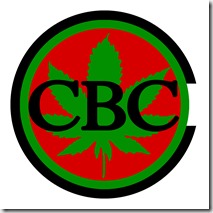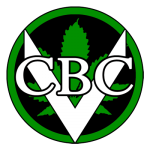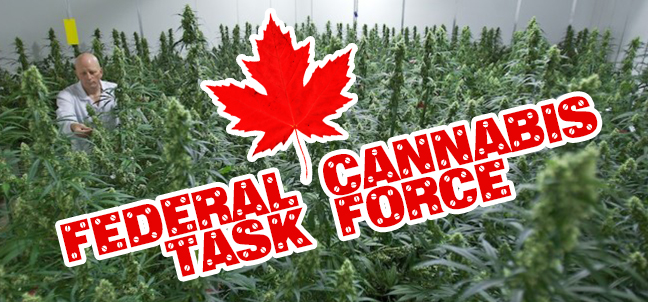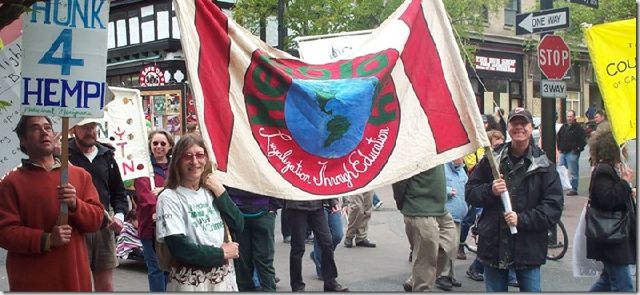Ted Smith
This month the Victoria Cannabis Buyers Club is celebrating 20 years of publicly providing cannabis products to patients. There is a lot to celebrate. While the recent victories of the club have been well documented, the early history is not so well known.
When I moved to Victoria in September 1995 to start a chapter of Hempology 101 my main focus was actually hemp. With 6 generations of Canadian farmers on both sides of my family, I felt I was acting as their advocate, fighting for their economic future and for the planet. However it was not long before some patients changed my course.
By that time word had spread about the work of Denis Peron and the San Francisco Cannabis Buyers Club. For those suffering from AIDS/HIV, cannabis was proving to provide relief from nausea and pain that was not available from any other medicine. With strong support from their local government, the San Francisco CBC was doing a great job educating the public about the benefits of cannabis in an open act of civil disobedience.
 Then I started to meet patients. They taught me how important cannabis was to them. In particular I remember one young lady who was clinging to life, who explained to me how she could not live without it. At the time I was living in my van, going to meetings, hanging out at the University of Victoria and immersing myself in west coast living. Eating in soup kitchens and living in poverty for the first time in my life convinced me of the terrible effects of the drug war and hardened my resolve to change things.
Then I started to meet patients. They taught me how important cannabis was to them. In particular I remember one young lady who was clinging to life, who explained to me how she could not live without it. At the time I was living in my van, going to meetings, hanging out at the University of Victoria and immersing myself in west coast living. Eating in soup kitchens and living in poverty for the first time in my life convinced me of the terrible effects of the drug war and hardened my resolve to change things.
Meeting a young baker who sold cannabis cookies, brownies, salves and massage oils had a huge impact on me. While I knew cannabis and hash could be made into food, it had never occurred to me that it would work as a topical ointment as well. Since I had been reading Chris Bennett’s book, GREEN GOLD: MARIJUANA IN MAGIC AND RELIGION, it struck me that this plant had been used as a medicine long before Jesus used it to heal the lepers. Leslie volunteered with several AIDS/HIV organizations during this time and many of the people coming to her home would tell me stories of how eating cannabis cookies helped them put on weight and feel like living again.
At the same time I was travelling back and forth to Vancouver as much as possible to keep up with movement there. Soon after taking over as manager of Hemp BC, Hilary Black began selling cannabis to patients in the back of the store. In fact, many people across Canada had been going out of their way to get cannabis in the hands of sick people but no one had yet formed a public organization with a mandate and contact information.
 It was not long before I determined that we needed a Cannabis Buyers Club in Victoria to ensure patients had easy access to all forms of medicinal cannabis products. Coming up with a mandate was not an easy task, as the SFCBC had very vague wording on its pamphlet and Hilary was deciding on a case by case basis. Leslie and I talked for months about where to draw the line, as it was very important to make sure patients were suffering from medical problems that would be serious enough to invoke constitutional protections without placing barriers to access in front of them. At the time even mentioning using cannabis as a medicine was a sure way to convince most doctors you were a drug seeker, more concerned with getting high than dealing with your medical issues. We had to come up with a simple mandate that would be fair to patient, acceptable by the public and satisfy the courts using cannabis as medicine should be one of our constitutional rights.
It was not long before I determined that we needed a Cannabis Buyers Club in Victoria to ensure patients had easy access to all forms of medicinal cannabis products. Coming up with a mandate was not an easy task, as the SFCBC had very vague wording on its pamphlet and Hilary was deciding on a case by case basis. Leslie and I talked for months about where to draw the line, as it was very important to make sure patients were suffering from medical problems that would be serious enough to invoke constitutional protections without placing barriers to access in front of them. At the time even mentioning using cannabis as a medicine was a sure way to convince most doctors you were a drug seeker, more concerned with getting high than dealing with your medical issues. We had to come up with a simple mandate that would be fair to patient, acceptable by the public and satisfy the courts using cannabis as medicine should be one of our constitutional rights.
Together we decided to require members to prove they have a written diagnosis from a doctor confirming they have a permanent, physical disability or disease. We thought that this mandate would ensure all of our patients suffered from health problems that the courts would consider serious enough to consider cannabis as a medical necessity. By not requiring the doctor to even know the patient is using the services of the club, we were able to protect members from any backlash that may occur from the medical system as a result of disclosing their use of cannabis as medicine.
At first the services we provided were quite minimal. For many reason I was determined not to make money for selling cannabis products to the sick and dying. When I got a pager call, I would often go visit the person to get the money before going to get the medicine, usually using my bike to save gas money. Since I assumed I would be busted at any moment, carrying large amounts in my van seemed a great way to put it all at risk and make myself a target for thieves. It was several months into the venture when Leslie finally convinced me to take more than the cost of the medicine so the club could buy scales, a safe and other equipment needed in our future storefront.
 Meanwhile, on the mainland, Hilary teamed up with a young man from Hempology 101 to start the Vancouver Medical Marijuana Buyers Club with a similar mandate. Unfortunately after a few months Hilary left to tour Europe and California to learn more about medical cannabis and Theo was not able to keep the organization going. For about 8 months there was no medical cannabis organization openly operating in Vancouver until May 1997 when Hilary returned to start the BC Compassion Club Society.
Meanwhile, on the mainland, Hilary teamed up with a young man from Hempology 101 to start the Vancouver Medical Marijuana Buyers Club with a similar mandate. Unfortunately after a few months Hilary left to tour Europe and California to learn more about medical cannabis and Theo was not able to keep the organization going. For about 8 months there was no medical cannabis organization openly operating in Vancouver until May 1997 when Hilary returned to start the BC Compassion Club Society.
During that time I was able to move into a small apartment on the edge of downtown to use as a home base. For almost 5 years the club used this little apartment as we slowly gained in membership and other resources. Then in March 2001, after a police raid in the building, we moved into the store and the rest, as they say, is history.
Down in the USA, the SFCBC ended up being raided by federal DEA agents and shut down. In response activists opened around a dozen clubs all over the San Francisco area and continued the fight using other banners. Certainly many other organizations deserve credit for getting the ball rolling in California in the 1990s, including Wo/Men’s Alliance for Medical Marijuana (WAMM) which is a collective of gardeners that give free cannabis to those in need. The world’s oldest medical cannabis collective, WAMM also played a lead role in the acceptance of medical cannabis.
 Now that the Victoria Cannabis Buyers Club has survived 20 years, including 5 police raids, too many robberies, and far too much internal turmoil, it would take several long blogs to fully explain how we were able to manage keeping it together. Being the founder of the world’s oldest medical cannabis dispensary has been a great honor and a surreal experience. While there are still challenges ahead, I have no doubt that in another 20 years the Victoria Cannabis Buyers Club will remain as a world leader in medical cannabis products and services.
Now that the Victoria Cannabis Buyers Club has survived 20 years, including 5 police raids, too many robberies, and far too much internal turmoil, it would take several long blogs to fully explain how we were able to manage keeping it together. Being the founder of the world’s oldest medical cannabis dispensary has been a great honor and a surreal experience. While there are still challenges ahead, I have no doubt that in another 20 years the Victoria Cannabis Buyers Club will remain as a world leader in medical cannabis products and services.





